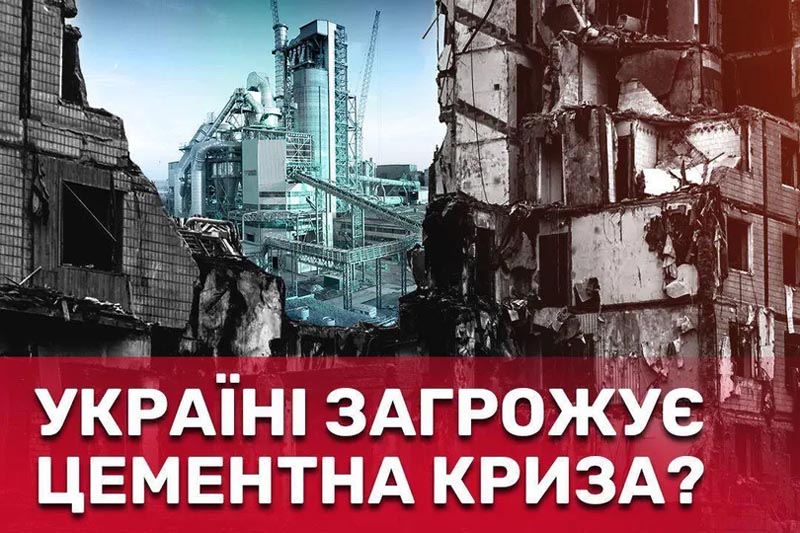«Монополия» на восстановление: в случае слияния CRH и Dyckerhoff цены на цемент могут подскочить в разы?


Украину ждет тотальное подорожание стройматериалов на фоне цементного кризиса в результате восстановления и возможной монополизации рынка – эксперты
Украинский цементный рынок – на пороге крупного кризиса: стране грозит дефицит стройматериалов для восстановления разрушенных войной городов из-за нехватки внутреннего производства. В то же время потенциальное соглашение между мировыми «гигантами» CRH и Dyckerhoff приведет к монополизации рынка и тому, что один игрок сможет диктовать собственные условия всему рынку.
Почему соответствующие органы в Украине почти не реагируют на агрессивное поглощение рынка цементным «картелем» ? Кто и почему тормозит решения, от которых зависит будущее отечественного рынка строительных материалов? Но чем грозит нашей стране возможное слияние ирландской и итальянской компаний-производителей? Детали – в новом расследовании
Недавно англоязычное издание The Kyiv Independent провело масштабное исследование потребностей и проблем украинского рынка при восстановлении разрушенной россией инфраструктуры. Авторы пришли к неутешительным выводам: на фоне восстановления украинцев может ожидать значительное подорожание стройматериалов, нехватка цемента и вероятная монополизация рынка.
Вот что по этому поводу говорят международные и отечественные эксперты:
«На концентрированном рынке предложение цемента будет меньше, чем на конкурентном, в то время как цены вырастут», – прогнозирует доцент Колумбийской бизнес-школы Бруно Пеллегрино.
«Нам нужно больше игроков и диверсифицировать рынок, а не делать его более компактным, потому что конкуренция очень слаба», – уверен Сергей Пилипенко, генеральный директор фирмы «Ковальская», крупнейшего потребителя цемента в Украине.
«Существует потенциал роста цен (ред. – на цемент). Это плохо, поскольку объемы (ред. – производства цемента) упадут», – предполагает профессор Кэтрин Томас из Лондонской школы экономики (LSE).
Следовательно, по данным издания, чтобы восстановить разрушенные врагом дома, дороги, объекты социальной и критической инфраструктуры государству необходимо не менее 487 миллиардов долларов.
Но эта цифра может существенно возрасти в результате прогнозируемого дефицита стройматериалов и их удорожания.
Ведь украинские цементными могут производить максимум 13 млн тонн цемента в год, и сюда учтены данные уже разрушенного россиянами завода «Балцем» на Харьковщине, а минимальная годовая потребность для восстановления — 15 млн тонн, говорит директор госпредприятия «Укрпромвнешэкспертиза» Владимир Власюк.
«По нашим оценкам, мощности по производству цемента, имеющиеся на 2022 год, у нас составляют около 13 млн тонн ежегодно. Потребность, как я сказал, 15,1-15,2 млн тонн в год. То есть вывод такой, что мы можем ожидать дефицита мощностей цемента во время восстановления. Мы его оценили примерно в 14%», – отмечает он.
За счет чего можно увеличить собственное производство?
В ирландской цементной компании CRH заявили в комментарии для Forbes Украина о готовности инвестировать в украинские цементные заводы минимум 100 миллионов долларов для увеличения внутреннего производства в стране до 15 млн тонн. К слову, в отечественном информпространстве в последнее время появилось немало публикаций и эксклюзивных интервью по поводу денежного вливания CRH в свой украинский бизнес, отмечает Алла Мартын.
Однако у, казалось бы, привлекательных перспектив есть и другая сторона медали, о которой СтопКор уже рассказывал в предварительных расследованиях.
Похоже, что компания CRH хочет стать монополистом на украинском рынке стройматериалов, выкупив активы своего конкурента Dyckerhoff (Buzzi). Итальянская компания стремится продать свои украинские цементные заводы ирландской компании, чтобы развивать бизнес в рф, как пишут медиа. И если CRH получит на это разрешение – станет владельцем наибольшей доли цементного рынка Украины/
Следовательно, ирландцы смогут диктовать свои условия и завышать цены на продукцию, опасаются производители стройматериалов.
«Если будет монополия на цемент, будет рост цен, мы будем вынуждены поднимать цены на свой продукт, и, конечно, отсюда будет подорожание квадратного метра жилья», – утверждает исполнительный директор Всеукраинской ассоциации производителей автоклавного газобетона Олег Сиротин.
С этим тезисом согласен и гендиректор промышленно-строительной группы «Ковальская».
«Первое и очевидное последствие – это повышение цен на всю линейку строительных материалов, содержащую цемент, потому что в результате монополизации я предполагаю, что будет полностью контролируемый рынок и при отсутствии импорта это будет довольно закрытая среда в которой производители могут диктовать условия», – комментирует Сергей Пилипенко.
Производители производных от цемента стройматериалов опасаются не безосновательно, потому что уже ощутили последствия сужения конкуренции на этом рынке.
Напомним, не так давно в Украине ввели антидемпинговую пошлину на более дешевый зарубежный цемент из Молдовы и Турции. И сделали это по инициативе объединившихся в ассоциацию украинских «цементников», фактически создавших олигополию в своей сфере, говорят эксперты.
По данным Лиги антитраста, представители которой обращались в АМКУ по этому поводу, после вытеснения конкурентов из-за границы участники ассоциации согласованно и безосновательно подняли цены на продукцию, когда даже удорожания электроэнергии не было, и сделали это для аномальных сверхприбылей, говорится в документе. Следовательно, систематически росли и продолжают расти цены на вяжущие, соответственно дорожают и производные стройматериалы, и ремонт, и новые квартиры и, собственно, восстановление Украины в результате войны.
И хотя глава ассоциации «Укрцемент» объясняет рост цен на их продукцию удорожанием себестоимости, по мнению ирландского бизнесмена Шеймеза Мея, причина может крыться в другом.
«Конечно, эти крупные компании скажут, что подорожание происходит из-за повышения цен на ресурсы, так они оправдывают повышение цен. Но на самом деле все эти люди, стремятся максимизировать доходы. Все кроется в захвате рынка и сверхнормальных доходах», – уверяет наш собеседник.
Напомним, это именно тот бизнесмен, который эксклюзивно рассказал СтопКору о некоторых эпизодах истории увлечения CRH мирового рынка.
На родине у господина Мея, по его словам, отобрали бетонный бизнес и оставили без крова. По его мнению, такая же участь может ожидать и украинских производителей стройматериалов, которым грозит поглощение на фоне стремительного роста издержек и отсутствия возможности сменить поставщика цемента.
Об искусственно созданной CRH монополии на цементном рынке много говорили депутаты Ирландии, писали ведущие мировые медиа, реагировали регуляторы многих стран Европы. А по монополии в Америке расследователи СтопКора нашли немало судебных решений по давлению бизнес-гиганта на местный бизнес и безосновательному завышению цен на стройматериалы.
Следует отметить, что наша редакция неоднократно пыталась получить комментарии от CRH, журналисты ездили к ним в офис и на производства, но встречи представители ирландской компании избегают, а на многочисленные запросы – не отвечают.
Так повторит ли Украина судьбу других рынков, где уже «доминирует» CRH – должен решить Антимонопольный комитет.
Еще в прошлом году в АМКУ приступили к рассмотрению дела о концентрации на цементном рынке и должны были завершить процесс не позднее трех месяцев, как они же и указывали в ответе на запрос Стопкора. Прошло уже семь месяцев, а официальных выводов по поводу рисков слияния СRH и Dyckerhoff в Украине так и нет.
«На запросы по этому поводу в комитете уже не отвечают, а встречи с журналистами избегают, несмотря на их обещания и наши неоднократные записи на официальный прием», – отмечает автор расследования.
По словам экономических экспертов, АМКУ может намеренно затягивать этот процесс.
«Есть огромная угроза по увеличению концентрации на данном рынке. В настоящее время проблема наибольшая проблема – это непрозрачность работы Антимонопольного комитета и достаточно длительные сроки проведения антимонопольных расследований», – считает руководитель инвестиционной компании «William Invest Expert» Виктор Медведь.
По этому поводу СтопКор уже обратился за комментарием к советнику главы Офиса президента Михаилу Подоляку.
И мы получили от него такой ответ: «Вы прекрасно понимаете, что любая монополия это крайне негативный процесс как таковой. Но у нас есть Антимонопольный комитет, и он будет заботиться о том, чтобы на рынке любых строительных материалов была определенная конкуренция. Если будет монополизация более 30%, мы понимаем, что цена будет зависеть от административных поощрений той или иной компании».
Какие возможны выходы из ситуации?
Повторное открытие украинского рынка для ввозного цемента из-за рубежа, по данным международных экспертов, может предотвратить проблему дефицита цемента и поднятие цен на стройматериалы.
«Отмена антидемпинговых пошлин смягчит беспокойство относительно приобретения CRH-Dyckerhoff и восстановит баланс на рынке, обеспечив конкуренцию за счет импорта», – подчеркнула Кэтрин Томас (LSE) в комментарии для Kyiv independent.
А вот народные депутаты считают, что лучше искать инвесторов, готовых строить свои заводы Украине.
«Нужно создавать в государстве такие условия работы, чтобы сюда хотели заходить разные инвесторы и здесь строили свои производственные мощности», – утверждает глава комитета ВРУ по вопросам организации государственной власти, местного самоуправления, регионального развития и градостроительства Елена Шуляк.
В то же время владелец «Криворожского цемента» Игорь Мазепа в комментариях для медиа заявил, что во время войны это вряд ли произойдет из-за плохих рыночных условий.
Стоит отметить, что в случае, если АМКУ таки позволит СRH приобрести мощности итальянцев, в Украине останется только три работающих производителя цемента – указанный CRH, Ивано-Франковск цемент и Криворожский цемент.
Таким образом, ирландцы, по подсчетам Forbes, будут держать в руках 46% рынка, что, так или иначе, может негативно повлиять на всю строительную промышленность Украины.
Напомним, АМКУ с октября прошлого года изучает потенциальное соглашение купли-продажи между компаниями CRH и Дикергофф, но рассмотрение дела о концентрации до сих пор не завершило. В случае если сделка будет акцептована, ирландский «гигант», выкупая активы конкурентов, может фактически поглотить украинский цементный рынок и дальше диктовать прайсы по своему усмотрению.
Recent Posts
Сбежавший в Швейцарию блогер Станислав Домбровский просит прощения у украинцев
Одесский трэш блогер Стас Домбровский, который в последнее время проживает в Швейцарии, записал видеообращение к…
Александра Устинова и атака на руководство АОЗ: что стоит за волной критики
Александра Устинова, народная депутат, которая в последние дни активно атакует Агентство оборонных закупок (АОЗ) возможно…
Журналисты показали имение киевской судьи, закрывшей дело Приходько
Свобода "под ключ" или манипуляция правосудием? Борис Приходько – нацбанкир времен Януковича и действующий нардеп…
Судьи вне закона
В течение последних трех лет внимание общественности если и бывает приковано к судам, то гораздо…
Артем Ляшанов и bill_line спасают репутацию через суд
Финтех-компания столкнулась с обвинениями в отмывании денег игорной мафии. ООО «Тех-Софт Атлас» (ТМ «bill_line») и…
Криптобиржа WhiteBIT: как Владимир Носов и «регионалы» Шенцевы отмывают деньги и помогают спецслужбам России
Владимир Носов в Украине пытается позиционировать себя как респектабельный бизнесмен и хозяин криптобиржи WhiteBIT. Однако…


